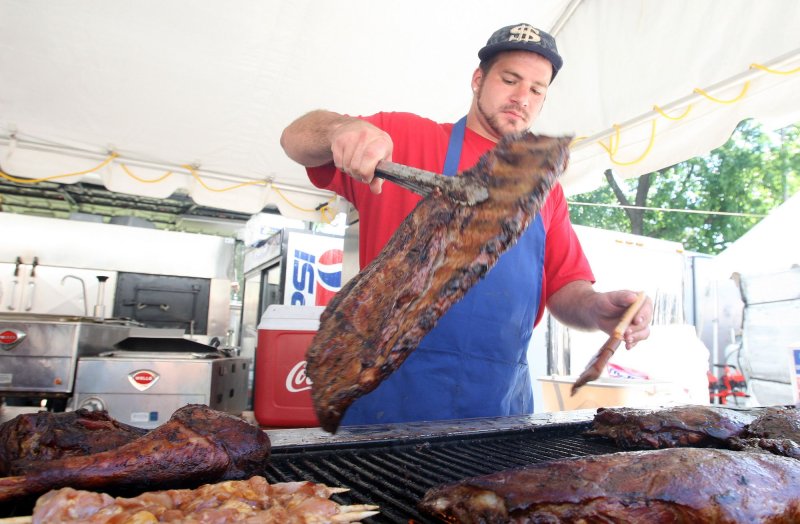Casey Luper of Fayetteville, Arkansas flips a slab of ribs as he prepares for the opening of Rib America Festival in St. Louis on May 28, 2010. The festival brings barbeque makers from around the country. UPI/Bill Greenblatt |
License Photo
CHICAGO, May 26 (UPI) -- As grilling season begins, the Institute of Food Technologists explains how a marinade works, how smoking infuses new flavors and why meat needs a rest after cooking.
Guy Crosby, spokesman for the Institute of Food Technologists, says there are many misconceptions about what works in a marinade.
"Typically, only salt or salty ingredients such as soy sauce make the biggest difference. It really depends on the type of meat and the muscle structure," Crosby says in a statement.
"The protein that forms when the salt breaks the muscle down helps to retain moisture, and makes the tissue a little looser."
Lime, lemon juice or vinegar don't have a huge impact, but they help break down some connective tissue and flavor the meat.
When smoking a piece of meat, oxygen breaks down the lignin -- a complex polymer of aromatic alcohols -- in wood and releases a smoky aroma that sticks to the moist surface of the meat, flavoring it, Crosby says.
However, it's an old kitchen myth that searing meat before cooking helps keep the juices inside. Searing does not trap or keep moisture inside a piece of meat.
For tough pieces of meat, the lower the cooking temperature, the less the fibers will shrink, and the less tough the meat will be because it won't lose as much moisture, Crosby explains. In addition, cooking the meat slowly breaks down tough connective tissue to form gelatin, which binds moisture.
Whether meat is grilled outdoors or roasted indoors, it should rest for 15 to 20 minutes before it is cut.
"When you cook meat the muscle fibers and the proteins begin to shrink and squeeze out moisture. If you immediately slice a piece of meat, the moisture that has been squeezed out of the muscle fibers will run out."
Once the meat has rested, the fibers start to soak back up some of the moisture, Crosby says.















